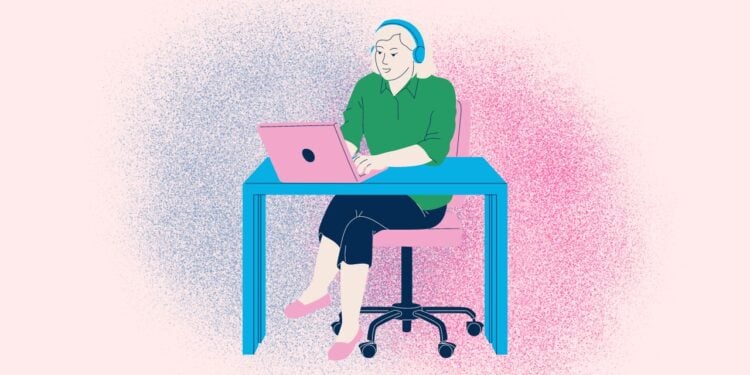- The rise of remote work has further fueled the demand for niche coworking spaces, including those specifically designed for women.
- The idea behind these spaces is less about keeping men out and more about bringing women together.
- Felena Hanson, owner of female-focusing coworking space the Hera Hub, explained to Allwork.Space how female-centric coworking spaces can stay afloat economically.
Female-centric/women-only coworking spaces have gained significant buzz in recent years, as they cater to the unique needs and preferences of professional women.
These spaces intend to provide a safe, supportive, and empowering environment for women to work, network, and grow their businesses.
The rise of remote work has further fueled the demand for niche coworking spaces, including those specifically designed for women. As more people embrace flexible work arrangements, it is expected that the popularity and success of female-only coworking spaces will continue to grow.
The trick is, popularity and success are two different things.
In recent years, there has been a surge in the popularity of female-only coworking spaces. However, it is important to note that not all female-only coworking spaces have achieved the same level of success. There are several factors that may contribute to the challenges faced by some of these spaces:
- Limited target audience: Female-only coworking spaces cater specifically to women, which dramatically narrows down their potential clientele. This can make it difficult for these spaces to attract a large enough membership base to sustain their operations and grow.
- Competition with co-ed coworking spaces: Many female professionals are comfortable working in mixed-gender coworking spaces, which offer a wider range of networking opportunities and resources. As a result, female-only coworking spaces face stiff competition from established co-ed spaces like IWG and Industrious.
- Lack of awareness: Some women may not be aware of the existence of female-only coworking spaces or their benefits. This lack of awareness can hinder the growth and success of these spaces.
- High operational costs: Running a coworking space requires significant investment in infrastructure, amenities, and staff. Female-only coworking spaces may struggle to generate enough revenue to cover these costs, especially if they have a smaller membership base.
- Resistance to gender-specific spaces: Some people may view female-only coworking spaces as discriminatory or unnecessary, arguing that they perpetuate gender segregation rather than promoting equality. This perception can deter potential members from joining these spaces.
While not all female-only coworking spaces may achieve the same level of success, those that can effectively address these challenges and cater to the unique needs of their target audience have the potential to make a significant impact in the professional lives of women.
Kathleen Buchanan, founder and CEO of Metro Offices, offered her insight into how female-led coworking spaces have evolved during her time in the industry.
“Women were the ones who really started this industry,” she told Allwork.Space. “They were the founders. So it’s really interesting, in my lifetime — I’ve seen it go from a woman-owned industry, to now more of a corporate industry.”
When asked whether female-centric working spaces are limiting their clientele options, Buchanan said “I think you do hurt your opportunity by eliminating half the population, but I also think that a lot of women would be attracted to working with other women — especially if there’s a mentoring program.”
Some may still be asking, “why would women-only coworking spaces be needed?”
Well, it’s more that they’re desired. The idea is less about keeping men out and more about bringing women together.
These spaces also ensure they offer amenities and services that are important to women, which many co-ed coworking spaces do not.
“In our space, we try to cater to women who are breastfeeding,” Buchanan said. “We make sure that there is security within the suite, and as much as possible in the parking lots. We just tried to have an environment where there is no prejudice, there is no discrimination, and there’s certainly no sexual harassment.”
The idea of this kind of space to work sounds ideal to many women, but it can be hard for these spaces to receive the funding and stable income that they need.
Felena Hanson, owner of female-focusing coworking space the Hera Hub, explained to Allwork.Space how female-centric coworking spaces can stay afloat economically:
“With seven locations, twelve years in business, and over 13,000 female entrepreneurs served, I can confidently say that surviving the ups and downs of the economy takes three things…
- Stay lean — don’t over hire, overspend, or commit to real estate that you can’t really afford.
- Stay focused — your members and your community will give you all kinds of advice and recommendations on what you ‘should’ offer. We have succeeded because we have stayed true to our mission of helping women build prosperous businesses. We are not a social club, we are not a wellness club; we are the place people go to build a business.
- Stay humble — twelve years into the business, I still connect with each of our members through our daily programming. I’m still in the space every day. And I still do what needs to be done to make the business successful… yes, sometimes that means cleaning the carpets or emptying the dishwasher. I want to show my team and my community that we are all in this together!”



 Dr. Gleb Tsipursky – The Office Whisperer
Dr. Gleb Tsipursky – The Office Whisperer Nirit Cohen – WorkFutures
Nirit Cohen – WorkFutures Angela Howard – Culture Expert
Angela Howard – Culture Expert Drew Jones – Design & Innovation
Drew Jones – Design & Innovation Jonathan Price – CRE & Flex Expert
Jonathan Price – CRE & Flex Expert












